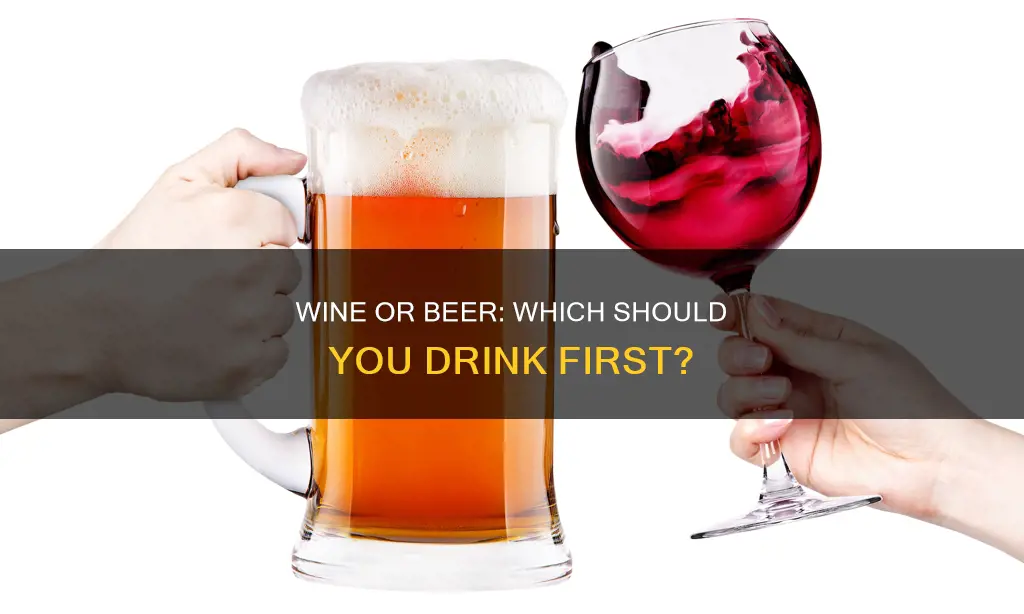
There is a popular saying that goes, beer before wine and you'll feel fine; wine before beer and you'll feel queer. This implies that the order in which you consume alcoholic drinks matters and can affect the severity of a hangover. However, researchers from Cambridge and Witten/Herdecke University set out to test this theory and found that it is a myth. In their study, participants who drank beer followed by wine did not experience worse hangovers than those who drank wine followed by beer. The researchers concluded that the total amount of alcohol consumed has a much bigger impact on how you feel the next day, rather than the specific order of drinks.
| Characteristics | Values |
|---|---|
| Number of participants in the study | 90 |
| Age of participants | 19-40 |
| Number of groups | 3 |
| Alcohol level in the body | 0.11% |
| Beer | Lager |
| Wine | White wine |
| Result | No correlation between hangover symptoms and the order of drinks |
What You'll Learn

Beer before wine, you'll feel fine
There is an old saying that goes, "beer before wine and you'll feel fine; wine before beer and you'll feel queer." This implies that drinking beer before wine will leave you hangover-free, while the reverse will give you a worse hangover. However, researchers have debunked this myth.
In a study, 90 participants between the ages of 19 and 40 were divided into three groups. The first group drank beer followed by wine, the second group drank wine followed by beer, and the third group drank only beer or wine. The participants drank until their breath alcohol level reached at least 0.11%, which is well above the legal limit for driving in the US. The experiment was repeated a week later, with the first two groups swapping their drink orders.
The researchers assessed the hangover symptoms of the participants after each drinking session. Surprisingly, they found no correlation between hangover intensity and the order in which the drinks were consumed. It didn't matter if the participants drank only wine, only beer, or switched between them; the total amount of alcohol consumed had a much bigger impact on how they felt the next day.
So, is there any truth to the saying, "beer before wine, you'll feel fine"? Well, it may be that parties where you start with wine tend to get more out of hand. You might get drunk faster on stronger drinks and lose track of how many drinks you've had. However, the order of drinks doesn't seem to matter when it comes to hangovers. The best predictors of a bad hangover are how drunk you feel and whether you vomit after drinking.
While the saying "beer before wine, you'll feel fine" may not hold true in terms of hangover prevention, it's always important to drink responsibly, never drive under the influence, and know your limits.
Beer and Gum Grafts: What You Need to Know
You may want to see also

Wine before beer, you'll feel queer
"Wine before beer and you'll feel queer" is a well-known saying that suggests drinking wine before beer will result in a worse hangover than drinking beer before wine. However, scientific research has debunked this myth, finding that the order of drinks does not affect the severity of a hangover.
In a study published in the American Journal of Clinical Nutrition, researchers from Cambridge University and Witten/Herdecke University in Germany set out to test the saying. They recruited 90 participants aged 19 to 40 and split them into three groups. The first group drank two and a half pints of lager followed by four large glasses of white wine. The second group consumed the same amount of alcohol but in reverse order. The third group, the control group, drank only wine or beer. The participants were monitored throughout the session and asked to rate their level of drunkenness. They were then given a glass of water and sent to bed under medical supervision. The next morning, the groggy-headed participants were quizzed about their hangovers and scored on the Acute Hangover Scale, which ranks factors such as thirst, fatigue, headache, dizziness, nausea, stomach ache, fast heart rate, and loss of appetite.
A week later, the experiment was repeated, with the groups switching the order of their drinks. Once again, the participants were monitored and asked to rate their hangover symptoms the next morning. Surprisingly, the results showed that the order of drinks had no impact on hangover intensity. This finding contradicts the common belief that drinking wine before beer will result in a worse hangover.
So, why do people still believe in the saying "wine before beer and you'll feel queer"? One theory suggests that starting with wine, which is usually stronger than beer, may lead to drinking faster and losing track of how much one has consumed, resulting in a worse hangover. However, the study found that the total amount of alcohol consumed, regardless of the order, was a more significant factor in determining hangover severity.
While the study specifically tested the effect of white wine and lager beer, it is important to note that previous studies have suggested that darker drinks, such as red wine, may contribute to more severe hangovers due to the presence of congeners, natural compounds that give distinct flavors and colors to liquor.
In conclusion, while the saying "wine before beer and you'll feel queer" has persisted for many years, scientific research has shown that it is nothing more than a myth. The order of drinks, whether wine or beer, has little impact on the severity of a hangover. Instead, the total amount of alcohol consumed and individual factors such as perceived drunkenness and vomiting are better predictors of how miserable one will feel the next day.
Beer Consumption in Canada: Average Citizen's Perspective
You may want to see also

Hangover intensity
The age-old question of whether to drink beer or wine first has been the subject of much debate, with many believing that the order of drinks has an impact on the severity of a hangover. However, recent studies have set out to debunk this myth and provide a definitive answer.
The saying "beer before wine and you'll feel fine; wine before beer and you'll feel queer" has long been used as a rule of thumb for drinkers hoping to avoid a hangover. The theory behind this adage is that starting with wine and then drinking beer allows the carbonation in the beer to make you more easily or quickly absorb the alcohol from the wine, leading to increased intoxication and a worse hangover.
However, research conducted by Dr Kai Hensel, a senior clinical pediatrics fellow at the University of Cambridge, set out to test this theory. The study involved 90 participants between the ages of 19 and 40, who were divided into three groups. One group drank beer followed by wine, the second group drank wine followed by beer, and the third group drank only beer or only wine. The participants consumed drinks until they reached a breath alcohol concentration of 0.11%, ensuring a consistent level of alcohol in their systems.
The results of the study showed that the order of drinks had no significant impact on hangover intensity. Participants in both the beer-then-wine and wine-then-beer groups reported similar hangover symptoms, including headaches, nausea, dizziness, and fatigue. Interestingly, the best predictors of a bad hangover were how drunk the participants felt and whether they vomited after drinking.
These findings were echoed by a separate study conducted by Harvard Health Publishing, which also found no correlation between hangover symptoms and the order in which drinks were consumed. This study compared groups who drank only wine, only beer, or switched between the two in either order, and similarly found no difference in hangover severity.
While the order of drinks may not affect hangover intensity, it is important to note that the type of drink may play a role. Consultant nutritionist Liv Bales states that the darker the drink, the worse the hangover, due to the presence of congeners—organic molecules that provide flavour but can also be toxic in the body. Red wine, in particular, has been cited as a culprit for worse hangovers due to its higher alcohol content and the creation of a toxic type of alcohol called methanol during the fermentation process.
In conclusion, when it comes to hangover intensity, the order of drinking beer or wine first does not seem to matter. However, drinking in moderation and paying attention to how drunk you feel and whether you vomit are better indicators of how you will feel the next day. Additionally, the type of drink and its alcohol content, as well as the presence of congeners, may contribute to the severity of a hangover.
Understanding Beer Portion Sizes: Standard Drink Explained
You may want to see also

Predicting a hangover
Hangovers are a painful reality for many people who drink alcohol, and while there is no way to completely avoid a hangover other than abstaining from drinking, it is possible to predict the severity of one.
The severity of a hangover is not determined by the order in which you consume alcohol, as the old adage "beer before wine and you'll be fine; wine before beer and you'll feel queer" suggests. A study conducted by researchers at Witten/Herdecke University in Germany and the University of Cambridge in the UK found that the order of drinks had no significant impact on the severity of hangovers.
Instead, the best predictors of a bad hangover are how drunk you feel and whether you vomit during or after drinking. The more drunk you feel, the more likely you are to experience a severe hangover the next day. Vomiting is also a strong indicator of a bad hangover, as it suggests that your body is already struggling to cope with the amount of alcohol consumed.
Other factors that can contribute to hangover severity include dehydration, disrupted sleep, gastrointestinal irritation, inflammation, and acetaldehyde exposure. Hangovers can also be influenced by ingredients other than alcohol, such as colourings and flavourings, which may explain why certain drinks, like bourbon, tend to cause worse hangovers than others, like vodka.
Additionally, women tend to experience slightly worse hangovers than men, although individual factors such as age, sex, body weight, and drinking habits do not appear to be significant predictors of hangover intensity.
To prevent a hangover, it is important to drink responsibly and in moderation. Drinking slowly, on a full stomach, and alternating alcoholic drinks with water can help reduce the severity of a hangover.
Old Beer: Is It Safe to Drink After 30 Years?
You may want to see also

Drinking responsibly
- Limit your intake: Healthy men should limit themselves to no more than two drinks a day and 14 drinks a week. Healthy women should limit themselves to no more than one drink a day and seven drinks a week.
- Never drink and drive: Always have a designated driver or take public transportation when drinking. Never drink on impulse when your only option is to drive.
- Eat and hydrate: Drink plenty of water and eat a substantial meal before drinking. Alcohol is a diuretic, so it's important to stay hydrated. Eating and drinking water will also slow the intoxication process.
- Plan ahead: If you know you have important things to do the next day, abstain from drinking. Drinking can take away valuable time from work, school, or other commitments.
- Pace yourself: Drink slowly and aim for one drink per hour. This gives your body time to process the alcohol.
- Know your limits: Understand your tolerance for alcohol and stick to your limit. This will help prevent poor judgment and reduce the risk of a hangover.
- Be mindful of your reasons for drinking: Drinking for social occasions or celebrations is different from drinking to reduce stress or prove something. Unhealthy motivations for drinking can lead to quicker intoxication and increased side effects.
- Understand the risks: There are no proven health benefits of moderate drinking, and none should be used as a reason to drink. If you have a history of alcohol problems or a family history of excessive alcohol use, it may be best to abstain completely.
As for the age-old question, "beer before wine or wine before beer?" recent studies have debunked the saying, "beer before wine and you'll feel fine." It turns out that the order of drinks does not matter when it comes to hangovers. The total amount of alcohol consumed has a much bigger impact on how you feel. So, whether you're drinking wine or beer, always remember to drink responsibly and pay attention to your body's limits.
Hot Beer: Safe to Drink or Not?
You may want to see also
Frequently asked questions
It doesn't matter whether you drink wine or beer first. A study by Cambridge and Witten/Herdecke University found that participants who drank beer followed by wine reported the same level of hangover intensity as those who drank wine followed by beer.
No, the order in which you drink alcohol does not matter. What matters most is the total amount of alcohol consumed and your individual tolerance.
There are two main causes of a hangover. Firstly, alcohol diverts water from your bloodstream to your bladder, resulting in dehydration and a headache. Secondly, the liver breaks down alcohol into a chemical called acetaldehyde, which is more toxic than alcohol, leading to hangover symptoms until it is metabolised.
The only reliable way to prevent a hangover is to drink responsibly and in moderation. Pacing yourself by drinking one drink per hour and alternating with water can help your body process the alcohol.







